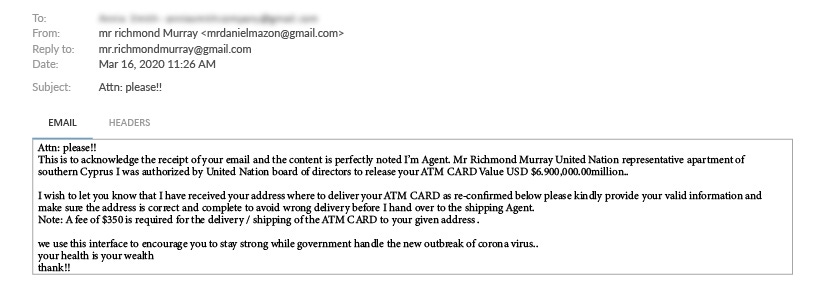Sommario
Cos'è il phishing tramite URL?
I criminali informatici utilizzano URL di phishing per cercare di ottenere informazioni sensibili per un uso dannoso, come nomi utente, password o dettagli bancari. Inviano e-mail di phishing per indirizzare le loro vittime a inserire informazioni sensibili su un sito web falso che sembra un sito legittimo.
Il phishing URL è anche conosciuto come: siti web falsi e siti web di phishing.

Come funziona il phishing tramite URL

Perché il phishing degli URL è importante
Circa il 91% delle violazioni della sicurezza inizia con un attacco di phishing, e molti di essi includono link dannosi a siti web falsi. L'uso di URL nelle e-mail di phishing è popolare ed efficace. Purtroppo, circa il 4% dei destinatari in una qualsiasi campagna di phishing clicca sul link dannoso, e gli hacker hanno bisogno solo di una persona per farli entrare.
Dato il tasso di successo, non sorprende che le perdite segnalate nel 2019 a causa del phishing abbiano raggiunto quasi 58 milioni di dollari. Questa è una cattiva notizia, considerando che solo il 57% delle organizzazioni ha una protezione degli URL in atto, secondo un recente sondaggio.
Negli ultimi anni, gli hacker hanno iniziato ad adottare tattiche di ingegneria sociale per evitare il rilevamento e ingannare gli utenti inducendoli a cliccare su link dannosi. Combinano il phishing tramite URL con tecniche di furto d'identità, utilizzano siti di nuova registrazione con alta reputazione — o addirittura dirottano un sito web di un'azienda legittima per la loro campagna di phishing, utilizzando reindirizzamenti o servizi di abbreviazione URL.
Come proteggersi dal phishing tramite URL
Esistono diverse strategie che puoi mettere in atto per proteggere i tuoi utenti e la tua azienda dagli URL di phishing:
Protezione dei link
Assicurati che la tua sicurezza e-mail includa protezione dei link o filtraggio URL. Queste tecnologie limiteranno l'accesso a URL specifici confrontando gli indirizzi dei siti che gli utenti tentano di visitare con una lista di blocco o una lista di domini noti come dannosi. La protezione dei link riscrive anche automaticamente questi URL in modo che possano essere scansionati dalla tua soluzione di sicurezza quando vengono cliccati per bloccare i link dannosi.
Protezione basata su IA
Gli attaccanti stanno adattando le loro tecniche per eludere i gateway e-mail e i filtri anti-spam, quindi una buona soluzione di spear-phishing che protegge dagli URL di phishing è un must. La protezione basata su intelligenza artificiale può identificare e bloccare URL anomali o di impersonificazione, che segnalano attacchi di phishing. Anche quando un sito web di phishing non è mai stato utilizzato in campagne precedenti o è ospitato su un dominio ad alta reputazione, la difesa della casella di posta può aiutare a proteggere da mirati attacchi di spear-phishing che utilizzano URL dannosi.
Training per la sensibilizzazione sulla sicurezza
Rendi il phishing tramite URL parte del tuo programma di training per la sensibilizzazione sulla sicurezza. Assicurati che il tuo personale sia in grado di riconoscere questi attacchi, comprenda la loro natura fraudolenta e si senta a proprio agio nel segnalarli. Utilizza la tecnologia di simulazione del phishing per testare l'efficacia del tuo training e valutare gli utenti più vulnerabili agli attacchi di estorsione.
Scopri di più sul phishing degli URL
Termini correlati
Ulteriori letture
In che modo Barracuda può essere di aiuto
Protezione Email Barracuda è una soluzione completa e facile da usare che offre difesa del gateway, protezione da impersonificazione e phishing basata su API, risposta agli incidenti, protezione dei dati, conformità e formazione sulla consapevolezza degli utenti. La protezione email Barracuda include:
- Gateway di Sicurezza Email Barracuda filtra e sanifica rapidamente ogni email prima che venga consegnata al tuo server di posta per proteggerti dalle minacce trasmesse via email. Utilizzando la scansione dei virus, la valutazione dello spam, l'analisi delle intenzioni in tempo reale, la protezione dei link URL, i controlli di reputazione e altre tecniche, Barracuda ti fornisce il miglior livello di protezione possibile.
- Protezione dal furto d'identità è un servizio in hosting nel cloud che utilizza l'intelligenza artificiale per la protezione in tempo reale dal spear-phishing e dalle frodi informatiche. Si connette direttamente a Office 365, quindi funziona insieme a qualsiasi soluzione di sicurezza e-mail senza impatto sulle prestazioni della rete o sull'esperienza utente.
- Il Training per la sensibilizzazione sulla sicurezza è la soluzione di simulazione e formazione basata su computer per la sensibilizzazione alla sicurezza più potente del settore. Utilizzando formazione e simulazioni all'avanguardia, il Training per la sensibilizzazione sulla sicurezza può insegnare ai tuoi dipendenti a riconoscere ed eliminare tentativi di spear phishing altamente specializzati.
Hai domande o desideri ulteriori informazioni su URL Phishing? Mettiti in contatto subito.